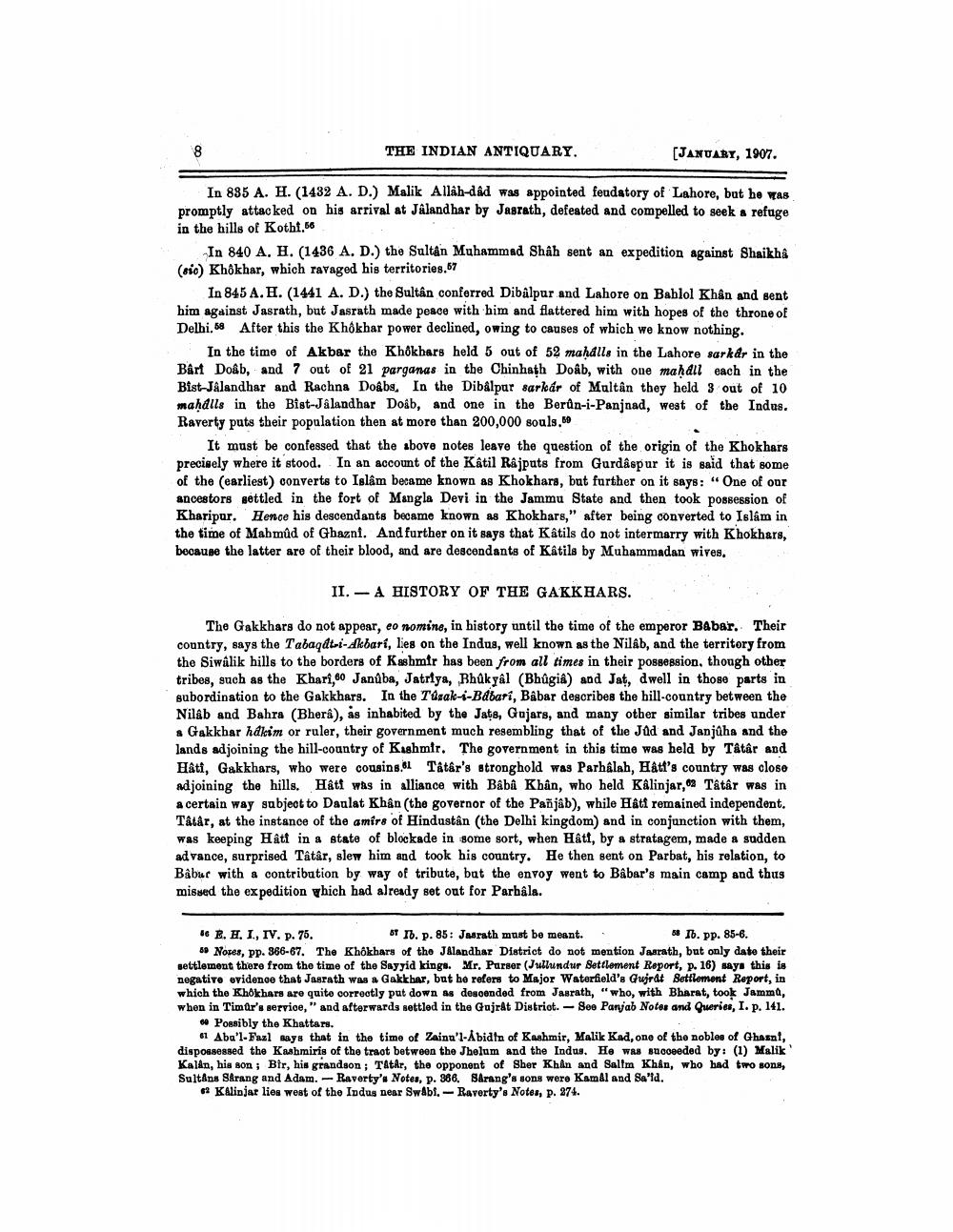________________
THE INDIAN ANTIQUARY
(JANUARY, 1907.
In 885 A. H. (1432 A. D.) Malik Allâh-dâd was appointed feudatory of Lahore, but he was promptly attacked on his arrival at Jalandhar by Jasrath, defeated and compelled to seek a refuge in the hills of Kothi.56
In 840 A, H. (1436 A. D.) the Sultan Muhammad Shah sent an expedition against Shaikh (sic) Khokhar, which ravaged his territories.67
In 845 A. H. (1441 A. D.) the Sultân conferred Dibalpur and Lahore on Bablol Khan and sent him against Jasrath, but Jasrath made peace with him and flattered him with hopes of the throne of Delhi.58 After this the Khokhar power declined, owing to causes of which we know nothing.
In the time of Akbar the Khôkbars held 5 out of 52 mahalls in the Lahore sarkar in the Bart Doab, and 7 out of 21 parganas in the Chinhath Doab, with one mahall each in the Bist-Jalandhar and Rachna Doâbs. In the Dibâlpar sarkár of Multân they held 3 out of 10 mahalls in the Bigt-Jalandhar Doab, and one in the Beran-i-Panjnad, west of the Indus. Raverty puts their population then at more than 200,000 souls.
It must be confessed that the above notes leave the question of the origin of the Khokhars precisely where it stood. In an account of the Kâtil Rajputs from Gurdaspur it is said that some of the earliest) converts to Islâm became known as Khokhars, but further on it says: “One of our ancestors settled in the fort of Mangla Devi in the Jammu State and then took possession of Kharipur. Hence his descendants became known as Khokhars," after being converted to Islám in the time of Mahmúd of Ghaznf. And further on it says that Kâtils do not intermarry with Khokhars, because the latter are of their blood, and are descendants of Kâtils by Muhammadan wives.
II. - A HISTORY OF THE GAKKHARS.
The Gakkhars do not appear, eo nomine, in history until the time of the emperor Babar. Their country, says the Tabaqdt-i-Akbarí, lies on the Indus, well known as the Nilâb, and the territory from the Siwâlik hills to the borders of Kashmir has been from all times in their possession, though other tribes, such as the Khari,60 Januba, Jatriya, Bhükyal (Bhügiâ) and Jat, dwell in those parts in subordination to the Gakkhers. In the Tdsak-i-Bdbari, Babar describes the bill-country between the Nilab and Bahra (Bhera), as inhabited by the Jate, Gojars, and many other similar tribes under
Gakkhar hakim or ruler, their government much resembling that of the Jud and Janjüha and the lands adjoining the hill-country of Kashmir. The government in this time was held by Tâtâr and Háti, Gakkhars, who were cousins. Tátâr's stronghold was Parhâlah, Hått's country was close adjoining the hills. Hâti was in alliance with Bâbân Khân, who held Kálinjar,62 Tâtâr was in a certain way subject to Daulat Khân (the governor of the Pañjab), while Hati remained independent. Tátâr, at the instance of the amirs of Hindustan (the Delhi kingdom) and in conjunction with them, was keeping Hati in a state of blockade in some sort, when Hatt, by a stratagem, made a sudden advance, surprised Tâtâr, slew him and took his country. He then sent on Parbat, his relation, to Babur with a contribution by way of tribute, but the envoy went to Babar's main camp and thus missed the expedition which had already set out for Parbâla.
4 E. . I., IV. p. 75. 67 Ib. p. 85: Jasrath must be meant. .
# Ib. pp. 85-6. 50 Notes, pp. 366-67. The Khokhars of the Jalandhar District do not mention Jagrath, but only date their settlement there from the time of the Sayyid kings. Mr. Parser (Jullundur Settlement Report, p. 16) says this is negative evidence that Jagrath was a Gakkbar, but he refers to Major Waterfield's Gujrat Settlement Report, in which the Khokhars are quito correctly put down as descended from Jasrath, "who, with Bharat, took Jamma, when in Timur's servioe," and afterwards settled in the Gujrat District. - See Panjab Notos and Queries, I. p. 141.
Possibly the Khattars. 61 Aba'l. Fazl says that in the time of Zainu'l-Abidin of Kashmir, Malik Kad, one of the nobles of Ghasnt, dispossessed the Kashmiris of the traot between the Jhelum and the Indus. He was succeeded by: (1) Malik Kalán, his son ; Bir, his grandson; Tatar, the opponent of Sher Khan and Salim Khan, who had two sons, Sultans Sarang and Adam. Raverty'. Notes, p. 386. Sarang's sons were Kamal and Said.
6 K Alinjat lies west of the Indus near Swabl. - Raverty's Notes, p. 274.




